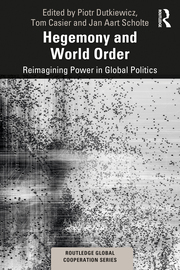
Conclusions: Hegemony and world order
Book descrpition
Hegemony and World Order explores a key question for our tumultuous times of multiple global crises. Does hegemony – that is, legitimated rule by dominant power – have a role in ordering world politics of the twenty-first century? If so, what form does that hegemony take: does it lie with a leading state or with some other force? How does contemporary world hegemony operate: what tools does it use and what outcomes does it bring?
This volume addresses these questions by assembling perspectives from various regions across the world, including Canada, Central Asia, China, Europe, India, Russia and the USA. The contributions in this book span diverse theoretical perspectives from realism to postcolonialism, as well as multiple issue areas such as finance, the Internet, migration and warfare. By exploring the role of non-state actors, transnational networks, and norms, this collection covers various standpoints and moves beyond traditional concepts of state-based hierarches centred on material power. The result is a wealth of novel insights on today's changing dynamics of world politics.
Hegemony and World Order is critical reading for policymakers and advanced students of International Relations, Global Governance, Development, and International Political Economy.
Please find more information here.



